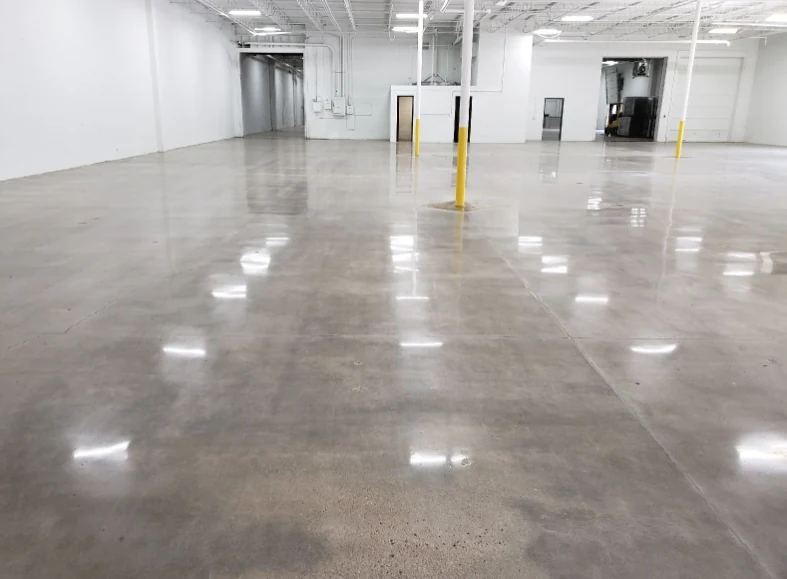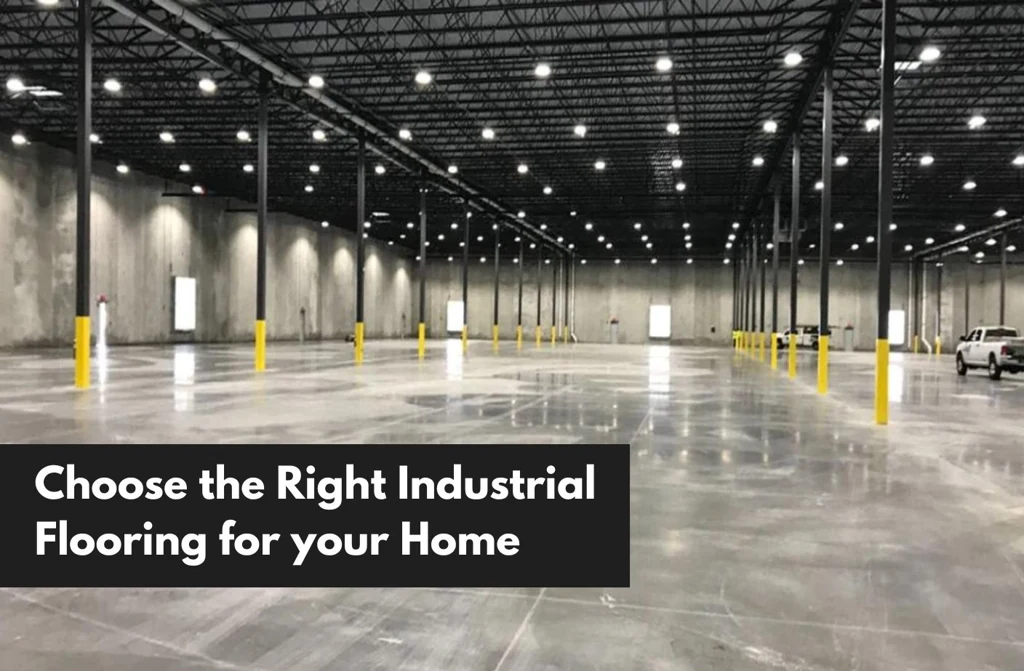Planning a home renovation or new build? Take some time to think about the floors you want to buy. People like traditional choices like hardwood, laminate, and tile.
But industrial flooring works great in places with a lot of foot traffic. Engineered to endure impact and tough conditions, industrial floors are solid and low-maintenance.
Let’s begin with this guide to discover how to choose the right industrial flooring for your home renovation.
Top Industrial Flooring Options
Allow us to become acquainted with the most common types of industrial flooring on the market before we start the decision process.
1. Epoxy Flooring
Epoxy flooring has exceptional resistance to chemicals wear and impacts, rendering it a top pick for garages, workshops, and basements. One of the key perks of epoxy floors, from my experience, lies in the effortless cleaning and upkeep particularly beneficial in areas with heavy foot traffic.
2. Polished Concrete
Polished floors have become increasingly popular as they combine affordability and low upkeep. Giving a concrete surface a shiny finish by refinishing and polishing results in a durable stain-resistant floor. Plus, you can elevate with a range of colors and designs to match your style effortlessly.
3. Interlocking Tiles
Interlocking tiles, known as modular flooring, offer a convenient and adaptable solution for industrial environments. These tiles made from PVC rubber or plastic can be effortlessly installed on any existing surface without damage.
Interlocking tiles don’t slip and can cushion impact. They also often have drainage systems built in, which makes them perfect for areas that get wet or spill things often.
4. Rubber Flooring
Rubber flooring merges as an exceptional option for spaces that demand efficient shock absorption and slip resistance.
Manufactured from recycled rubber, it serves as a conscientious choice towards environmental sustainability. Widely found in gyms, play areas, and industrial settings with heavy equipment, these floors offer both comfort and functionality, featuring noise reduction and thermal insulation properties.

Factors to Consider When Choosing Industrial Flooring
We’ll talk about the most important things you should think about when you don’t know how to choose the right flooring for your home.
1. Area of Application
Selecting industrial flooring depends on the area. Different parts of your residence necessitate different materials. For example, garages require epoxy or polished concrete for durability, while basements or playrooms are best suited for interlocking tiles or rubber flooring due to their moisture and shock resistance.
2. Foot Traffic and Usage
Another important consideration is the amount of foot traffic and usage the area will experience. For high-traffic areas like entryways, hallways and mudrooms opt for floors that can take a beating without showing a scratch. Epoxy and polished concrete emerge as top choices due to their exceptional durability and low maintenance requirements.
3. Moisture and Spill Resistance
When you’re considering flooring for prone areas such as laundry rooms, bathrooms, or kitchens. Are you wondering about the ideal water-resistant and easy-to-clean option?
Enter epoxy and interlocking tiles, the unsung heroes of moisture combat. These flooring choices repel water and stand firm against dampness, making them perfect for such spaces.
4. Slip Resistance
Safety must be the utmost concern when selecting industrial flooring, notably in places susceptible to slips and falls. Rubber flooring and specific types of interlocking tiles feature slip-resistant surfaces, rendering them perfect choices for locations like gyms, basements, or outdoor patios.
5. Aesthetic Appeal
Industrial flooring needs to withstand the test of time, and for homeowners, it’s about finding designs that truly reflect their style. Polished concrete and epoxy flooring offer a canvas for customization, ensuring a distinctive look for every space. There are endless color options to suit individual tastes, whether you prefer interlocking tile or rubber flooring.
6. Maintenance and Cleaning
When caring for industrial flooring, think about the time and effort you’re ready to invest. Epoxy and polished concrete floors are low-maintenance, needing only occasional sweeping and damp mopping. Interlocking tiles are easy to replace or clean, while rubber flooring may need more frequent cleaning to avoid stains and odors.
7. Budget
Your budget is pivotal in choosing industrial flooring. Polished concrete and interlocking tiles are cost-effective. Epoxy and rubber floors, especially custom options, can be pricier.
Also Read: Tips for Choosing the Right Wall Design
Installation and Maintenance Tips
Once you’ve selected the perfect industrial flooring for your home, it’s essential to ensure proper installation and maintenance to maximize its lifespan and performance.
Installation
- Prefer professional renovation company or contractors who have experienced in industrial flooring systems. A meticulous installation process is indispensable for guaranteeing both the longevity and high performance of the flooring system.
- Ensure the surface is squeaky clean before getting down to the installation; rid it of all debris cracks and irregularities.
Maintenance
- Regularly sweep or vacuum the floor to remove dirt and debris that can cause scratches.
- Stick to the maker’s cleaning recommendations. Steer clear of potent chemicals or abrasive cleansers that may cause damage to the floor.
- Handle spills and blemishes immediately to prevent the situation from worsening and making removal more challenging.
- A protective sealant should be applied regularly to epoxy and polished concrete floors to improve durability and cleaning.
- Ensure you replace any tiles or rubber flooring sections that are worn out or damaged as needed to maintain a smooth and secure area.
Conclusion
You might get your answer on how to choose the right industrial flooring for your home. When choosing the ideal industrial flooring for your home, consider aspects such as the usage space, foot traffic intensity, moisture resistance, aesthetic appeal, maintenance needs, and financial constraints.
Digging into the strengths and weaknesses of each type can guide you in selecting a flooring option that elevates both functionality and visual charm.
Follow the manufacturers’ guidance and consulting professionals from the Luxe Interior to install and maintain your flooring. Opting for the correct flooring will give you a classy, enduring, and easily manageable solution.











